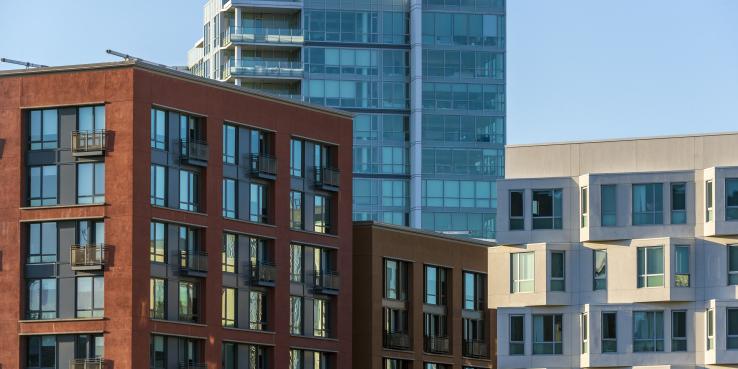Over the past two weeks, Governor Gavin Newsom signed into law seven pro-housing production bills sponsored and supported by SPUR and allied members of our statewide California Home Building Alliance. This capped a very successful year of housing advocacy in the Capitol. We’re thrilled with the results of this legislative session and grateful to our partners in this work.
Our Big Housing Wins: SPUR-Sponsored Legislation
SPUR worked closely with the authors of two housing-related bills that were signed into law this legislative session:
AB 2097 (Friedman) is a historic parking reform breakthrough that prohibits cities from setting local minimum parking requirements on residential, commercial and mixed-use developments within a half-mile of a major transit stop. The legislation, which was endorsed by the Los Angeles Times Editorial Board, will make housing more affordable to build and reduce carbon emissions from driving. SPUR co-sponsored this legislation with the Bay Area Council, California YIMBY, Abundant Housing LA and the Council of Infill Builders.
AB 2668 (Grayson) is clean-up legislation to SB 35 (Wiener), the landmark 2017 housing approvals streamlining law. It will help to create more housing by clarifying how SB 35 applies in four specific situations: 1. applying SB 35 to existing rules around conditional use permits, 2. calculating inclusionary housing percentages as they relate to density bonuses, 3. allowing SB 35 streamlining to be used on sites with underground storage tanks and 4. preventing local governments from rejecting proposed project modifications that are missing some application materials if the application contains substantial evidence that the development is consistent with objective planning standards. SPUR co-sponsored this legislation with the Bay Area Council.
More Housing Wins We Supported
SPUR advocated for and supported five other successful bills this session:
AB 2011 (Wicks) is the high-profile measure to allow affordable and mixed-income housing developments to be built in commercial zones. This legislation will tackle California’s housing shortage in two ways: unlocking real estate for housing, and addressing the state’s shortage of construction workers by requiring prevailing wages, apprentice programs and health care benefits for construction workers. Research estimates that it would open up 108,000 acres of land for mixed-income housing. Earlier this month, SPUR hosted a Digital Discourse program with the bill author and sponsors to celebrate its passage by the Legislature.
AB 2295 (Bloom) will make housing more affordable for teachers and other school staff by allowing school employee housing to be built on school district property. Last week, SPUR hosted a Digital Discourse program about scaling up and expediting the development of school employee housing with the bill’s author, Assemblymember Richard Bloom, and bill sponsors cityLAB UCLA and the California School Boards Association.
AB 2234 (R. Rivas and Grayson) speeds up housing production by setting timelines for several steps in the permitting process. Local agencies will have time limits to determine whether an application for a building permit is complete and to approve the permit. The legislation also establishes that failure to meet these timelines constitutes a violation of the Housing Accountability Act. AB 2234 also sets timelines for jurisdictions of various sizes to adopt an online permitting process. The bill was sponsored by the Housing Action Coalition and Silicon Valley Leadership Group.
AB 2334 (Wicks) expands the geography for the enhanced density bonus that is currently available to affordable housing developments within one-half mile of a major transit stop. The new rules will extend the density bonus to affordable housing in urban areas where existing residential development generates less driving than average for the city or region. The bill was sponsored by the California Housing Consortium and Housing California.
SB 897 (Wieckowski) provides a number of clarifications and enhancements to existing accessory dwelling unit (ADU) law. First, it increases the height limit for ADUs from 16 feet to 25 feet when the unit is attached to an existing home. Second, it provides that the construction of an ADU does not constitute a residential occupancy change under the local building code. And third, it clarifies that the local jurisdiction shall either approve or deny the application within 60 days. The bill was sponsored by the Bay Area Council and continues to build on the group’s groundbreaking ADU work with Senator Wieckowski and other legislators over the past six years.
The One That Got Away
Unfortunately, one bill SPUR sponsored, AB 2656 (Ting), didn’t pass this session. The bill would have amended the Housing Accountability Act to clarify that it is a violation of the act for a local jurisdiction to wrongfully deny or withhold an environmental clearance that an urban infill housing development is legally entitled to. Although it received strong bipartisan votes throughout the legislative process, the bill was held in the Senate Appropriations Committee. CalMatters columnist Dan Walters recently wrote about the bill. We are grateful to Christopher S. Elmendorf, Martin Luther King Jr. Professor of Law at UC Davis School of Law, for his outstanding pro bono legal work on this legislation.
SPUR is currently considering various bill ideas and legislative and budget priorities for 2023. For more information or to make recommendations, contact Michael Lane at [email protected]
